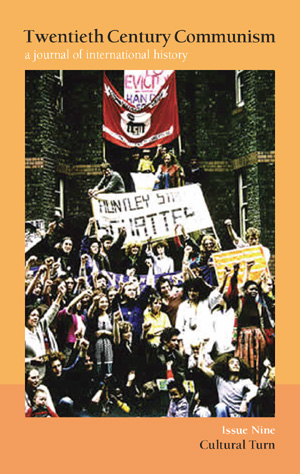
British Marxist Historians and Socialist Strategy: Within, Beyond and After the Communist Party
Twentieth Century Communism - Print ISSN 1758-6437 - Online ISSN 2978-1329
Volume 2015 Number 9
British Marxist Historians and Socialist Strategy: Within, Beyond and After the Communist Party
Adria` Llacuna
Abstract
Gregory Elliott, Hobsbawm. History and Politics, London: Pluto Press, 2010
Scott Hamilton, The Crisis of Theory. EP Thompson, the New Left and postwar British politics, Manchester: Manchester University Press, 2011
David Howell, Dianne Kirby and Kevin Morgan (eds.), John Saville. Commitment and History. Themes from the life and work of a socialist historian, London: Lawrence & Wishart and Socialist History Society, 2011
The names of Eric Hobsbawm, E.P.Thompson and John Saville do not require much introduction as their outstanding historical production speaks for itself, and they are widely known inside and outside the academic field of history. Even from the Spanish perspective, as far as this author is concerned, much of ‘the making’ of the social history in Spain has had a clear Thompsonian affiliation, while Hobsbawm’s interpretation of contemporary history in his famous tetraology is commonly referred to and widely circulated.2 Their works, which are so central to the historiography of the twentieth century (and also of the twenty-first) are not only important in themselves, but are even more illuminating if they are placed in the historical and intellectual context in which they were produced. Recently, their contribution to the understanding of the ‘long’ contemporary era has inspired several new studies which have scrutinised the biographical, intellectual and historiographical context in which their work was created. This essay considers three key recent books which all shed light on the importance of the intellectual and political formation of each of these historians on several levels: as individuals; in terms of their engagement in the creation of an indigenous marxist interpretation of history through the institutionalised form of the Historians’ Group of the Communist Party of Great Britain (CPGB); in the context of the historiographical and political contributions they made after distancing themselves or breaking with the party during the crisis of 1956; and finally, the different political interventions they tried to articulate on the British Left during the several decades following 1956, which grew in parallel with their expansive historical writings.
SORRY - you are not registered as being permitted online access to the full text of this article
You have the following options:
- If you are viewing this via an institution or academic library you can ask that your institution takes out a Subscription to this journal.
- If you already have a Personal Subscription please login below
Forgotten your username / password? Click here to locate
- Purchase an annual Personal Subscription
PRINT + DIGITAL personal subscription (£30 / year)
DIGITAL personal subscription (£25 / year)
A Personal Subscription provides immediate access not only to the single article you are seeking, but also to all past and future articles in this journal up to the expiry of your annual (calendar year) subscription. - Purchase immediate access to this single article (UK£7.00) - Buy article Coming Soon
To cite this article
Adria` Llacuna (2015) British Marxist Historians and Socialist Strategy: Within, Beyond and After the Communist Party, Twentieth Century Communism, 2015(9)
